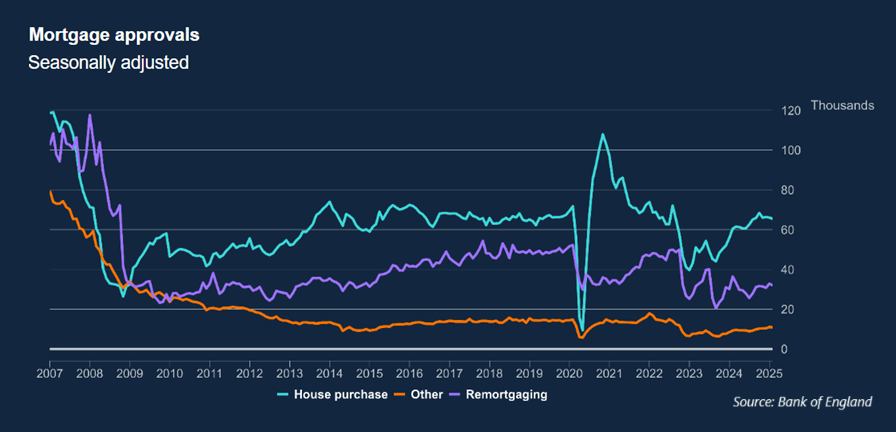Approvals and remortgaging activity decline as affordability concerns persist

Mortgage borrowing in the UK fell by £0.9 billion in February, bringing total net lending down to £3.3 billion, according to the Bank of England’s (BoE) latest Money and Credit report. This follows a £0.9 billion increase in January, interrupting the upward trend in lending.
The annual growth rate for net mortgage lending edged up to 1.9% in February, compared to 1.8% in the previous month. Gross lending increased to £24.3 billion, while gross repayments rose to £19.8 billion from £16.3 billion.
Mortgage approvals, a leading indicator of future borrowing, fell by 600 to 65,500 in February, following a smaller dip in January. Remortgage approvals — where borrowers switch to a new lender — also dropped by 800 to 32,000, reversing the upward trend seen earlier in the year.

Commenting on the latest BoE lending figures, Jason Tebb (pictured left), president of property portal OnTheMarket, said that while approvals for house purchases dipped, market stability and buyer confidence continues to be steady.
“As the rate on newly drawn mortgages rose again in February, along with the rate on outstanding mortgage stock, affordability remains a concern for borrowers,” Tebb said. “Two rate reductions in the second half of last year, followed by one so far this year, is helping, but mortgage rates are still higher than many have grown used to in recent years.
“Further reductions from the Bank of England would provide a welcome shot in the arm for the market, particularly with the Stamp Duty concession ending today.”
Mark Harris (pictured centre), chief executive of mortgage broker SPF Private Clients, agreed with Tebb, noting that additional rate cuts from the central bank would boost confidence and improve affordability.
“With mortgage approvals falling only slightly in February, it’s steady as she goes for the market,” Harris said. “Further reductions from the Bank of England will help improve confidence and affordability, particularly once the Stamp Duty concession has ended.”
Richard Pinch (pictured right), senior director of risk at financial consultancy Broadstone, however, said concerns around the broader economic environment remain.
“Continued economic uncertainty, stickier inflation and therefore interest rates, plus the end of the Stamp Duty holiday all appear to be conspiring to deter home buyers with both mortgage borrowing and approvals falling in February,” Pinch pointed out. “Despite the strength of the property market in terms of pricing, it is clear that there is still considerable fragility in consumer confidence at the minute.
“As global economies hold their breath as they wait to see the detail and impact of US President (Donald) Trump’s tariffs on Wednesday, it seems unlikely that sentiment is likely to strengthen in the near-term although there is still the prospect of at least a couple of interest rate cuts from the Bank of England.”
Any thoughts on the figures revealed in this Bank of England report? Share them with us by leaving a comment in the discussion box at the bottom of the page.



